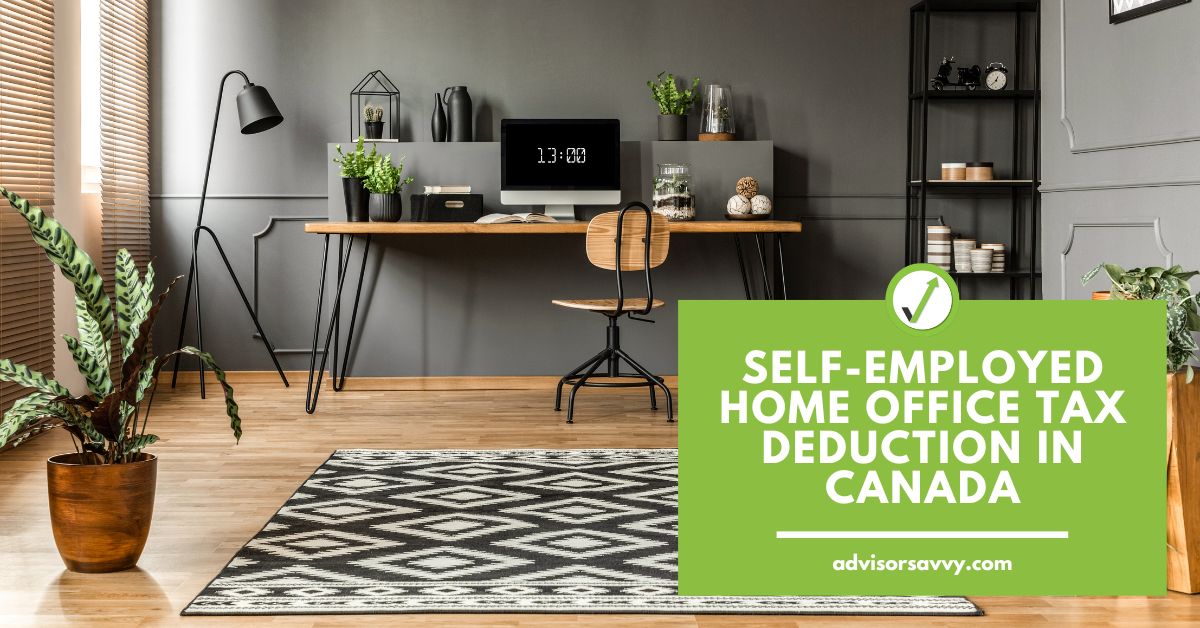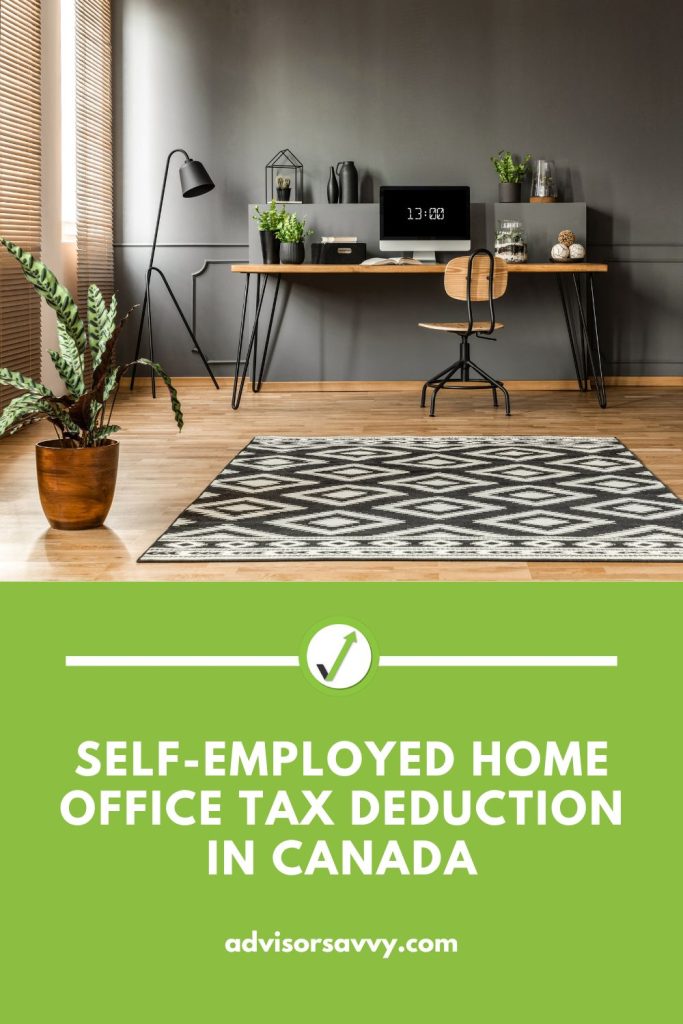
A lot of people are self-employed and choose to work remotely from their home offices. For Canadians, there’s more to the flexibility and ease of remote work – the self-employed home office tax deduction in Canada. The Canada Revenue Agency (CRA) allows self-employed people to take a deduction from their home office expenses. This benefit reduces the total amount of tax paid every year. However, there are rules to follow if you don’t want your tax claim to be denied. In addition, there are several eligible expenses the CRA allows you to use in a home office tax deduction. Generally speaking, if you have a dedicated workspace in your home, there’s a good possibility for a claim of the self-employed home office tax deduction in Canada. Continue reading to understand if you’re eligible and how much you can claim!

Table of contents
What is the self-employed home office tax deduction in Canada?
A home office tax deduction is an amount that reduces your tax obligation related to your home workspace. Qualified workers can claim the deduction if they have an office space in their home that is primarily used for business. If you are a small business owner or sole proprietor, the self-employed home office tax deduction in Canada is a big deal. It helps you reduce your tax burden while being able to enhance your operations by having a handy workspace.
The CRA defines a self-employed person as someone who signs a service contract with a business or any other payer. When a self-employed person is paid, they receive gross payments. It is their responsibility to take care of their own Canada Pension Plan (CPP), insurance obligations, and tax. Furthermore, self-employed people offer a specific product or service to their clients. They do not have an employee-employer arrangement.
Whether you are self-employed or an employee, you can claim a home office deduction, especially if you meet certain criteria. You need to be certain your home office qualifies for these deductions. In addition, verify all home office expenses are eligible to claim.
If your home office qualifies for the self-employed home office tax deduction in Canada, you can claim the following household expenses:
- Rent
- The cost of utilities
- Maintenance and repairs
- Property taxes
- Mortgage interest
- Home insurance
Note that to claim expenses for your home office used for tax deductions, you should be able to provide evidence to support your claims. This means adequate receipts and other financial records.
What are the rules for claiming home office expenses?
To be able to claim your home office expenses, you have to follow at least one of the following conditions below:
- The home office is your principal place of business or used exclusively to earn income from business: Your home office space should be a dedicated spot that is primarily used for your business and nothing else. For example, if you have a home office space in your living room, only the portion that serves as your office is deductible, not the entire living room.
- The home office is consistently and continuously set up to meet your clients: Your home office space may not just be the place you work. Every form of business activity must be conducted there, including meeting customers and clients. If you regularly hold meetings there, your home office would meet this criterion (this includes video calls!)
You meet the criteria if you can conduct most of your business operations, including administrative jobs and back office tasks, from home. Keep in mind that you may not be able to use any of the eligible expenses mentioned earlier to create or increase a loss for the year. However, you can move it to another tax season.
Related Reading: Best Places to Retire in Ontario
Can you claim home office expenses if you are self-employed?
Yes. Self-employed people can claim home office expenses from their business income if they meet the criteria. The self-employed include small business owners, sole proprietors, people with freelance side gigs (even those working under employers), and people who were self-employed in the short term.
If you are self-employed and have a space to carry out your business activities at home, you may take a self-employed home office tax deduction in Canada. However, the deduction should include business expenses, such as cleaning and maintenance of your office, and other key expenditures to maintain the space.
Can you write off a home office in Canada?
Yes. You can write off some of your home office expenses on your taxes if you are self-employed and work from home. The home office deduction allows you to write off any portion of your home that you use regularly and exclusively for work.
The two ways to deduct home office expenses in Canada include:
- Simplified Method: This method uses a standard deduction of $5 per square foot of any business home office up to a maximum of 300 square feet.
- Regular Method: This method uses the actual expenses you incur. With this method, you can deduct many types of expenses including furniture, appliances, utilities, maintenance, insurance, and more.
Can I write off a new desk for a home office?
Yes. There are various furniture needs you may incur when it comes to making your home office suitable, which includes a desk. As the home office furniture is used in your business for several years, the tax deductibility will depend on the Capital Cost Allowance. A functional home office desk may be identified as a capital expense. This refers to the costs that you incur when purchasing assets that have a serviceable life of over 1 year.
The criteria for what office furniture can be claimed for tax deductions are:
- A record of the expenses is available
- The expenses are for carrying out work and not for private use
- In cases where the expenses are for both work and private use, then you can only claim the work component
Can I write off a laptop for work self employed?
Yes. Self-employed individuals or business owners can claim a tax deduction on certain home office expenses that are used to carry out their business. Some of the home office equipment tax deductions include:
- Computer and desktop consumables
- Home office equipment and furnishings
- Phone and internet expenses
Whether it is a new laptop or desk accessory, you will most likely be able to claim tax-deductible home office furniture and equipment.
Related Reading: How to Write a Cheque in Canada
How do I claim home office when self-employed?
If you are self-employed and remotely running a business, you are eligible to claim a deduction for expenses of your home office. However, this is to the extent that you have incurred costs to earn business income. Below are the two ways you can claim home office expenses when self-employed.
1. Self-employed but not incorporated
Make claims using Form T2125, which is a statement of business activities that reports all revenues and expenses cut across your business. You can deduct some of the home office business expenses including heat, electricity, insurance, and more.
If you want to calculate the right amount to deduct, add up all your home office expenses and assess them. You can do this when you determine the portion of the total finished home that you use for business.
In cases where you use a portion of your home for both your business and personal living, calculate the hours you use the rooms for your business and divide by 24. This will help you determine the portion related to the household.
2. Self-employed but incorporated
If you’re incorporated, you will have to fill out two tax returns each year. One for your personal items and one for your corporate items. Note that corporate taxes are a lot more complex than personal tax returns. However, you can make claims by doing any of the following:
- You can allocate your home office costs to the corporation, instead of reporting them on your personal taxes.
- Complete Form T777 or T777S. If you pay yourself a monthly salary, you can deduct your home office expenses as an employee on your tax return. These forms are a Statement of Employment Expenses and the simplified pandemic version of the statement, respectively.
The better option would be to charge rent to the corporation since the business itself could deduct more expenses. Moreover, there are fewer eligibility restrictions compared with deducting home office expenses as an employee versus as a business expense.
Making the Most of the Self-Employed Home Office Tax Deduction in Canada
Having a personal computer or a well-furnished desk is not enough to make your home office conducive for work. If you want to avoid any unpleasantries in your workspace, you must understand home office deduction rules. You must be able to properly apply for a self-employed home office tax deduction in Canada. Knowing how it works and what it entails will allow you to make the necessary claims for a deduction.
As a self-employed person in Canada, it may be possible to do your taxes on your own, but contacting a financial advisor will help you determine what is available as a deduction. A professional will not only reduce your tax-related stress, but they may also discover other deductions during the process. What’s more? You could choose to deduct their fee from your taxes next year!
Read More: How To File Self-Employed Taxes In Canada
